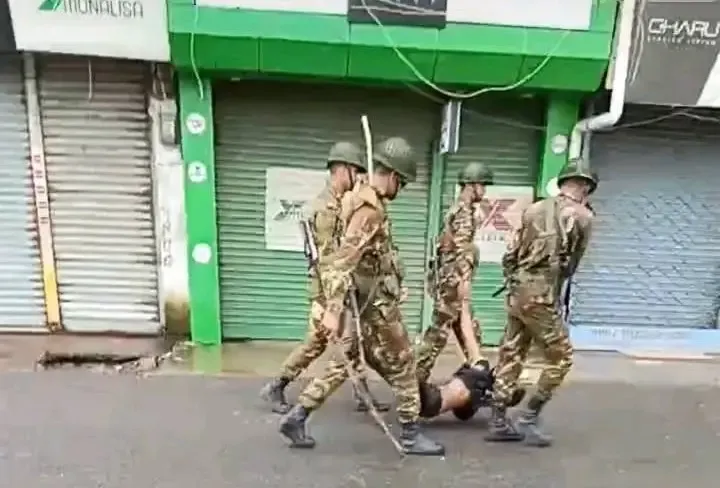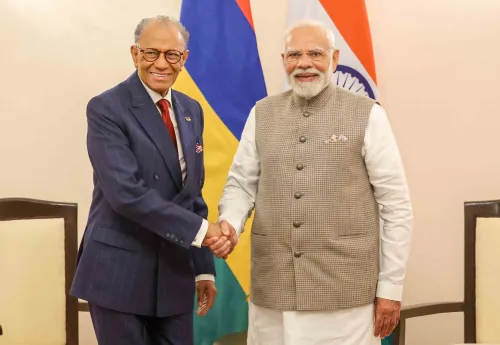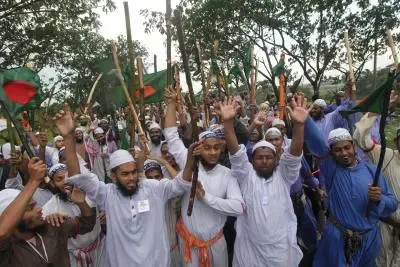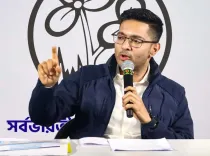What Does a Rights Group Reveal About Crimes in Bangladesh Before the EU Delegation's Visit?

Synopsis
Key Takeaways
- Human Rights Violations: Alarming reports of violence and suppression under the Yunus-led government.
- Judicial Control: The interim government exerts influence over the judiciary, affecting justice delivery.
- Media Suppression: Journalists face revocation of accreditations and false charges.
- Religious Violence: Significant attacks on religious minorities and cultural sites.
- Urgent Monitoring Needed: Calls for international oversight and accountability are critical.
Dhaka, Sep 15 (NationPress) A prominent global human rights organization has reached out to the European Union's delegation prior to its three-day visit to Bangladesh commencing Tuesday. They expressed profound concern regarding serious human rights violations, the decline of law and order, and the deteriorating economic situation under the leadership of the Muhammad Yunus-led interim government.
Local media has reported that the EU's five-member delegation, which includes Arkadiusz Mularczyk (ECR, PL), Urmas Paet (Renew Europe, Estonia), Mounir Satouri (Greens/EFA, FR), Human Rights Subcommittee Chair, Isabel Wiseler-Lima (EPP, Luxembourg), and Catarina Vieira (The Greens/EFA, The Netherlands), will be visiting Bangladesh from September 16-18 to assess reforms and the human rights landscape in the nation.
In a letter addressed to the European delegation, the Justice Makers Bangladesh in France (JMBF) pointed out that since Yunus took office, the law and order situation in this South Asian country has sharply declined, with more than 637 individuals falling victim to orchestrated mob violence, including 205 leaders and activists from the Awami League and its associated organizations.
The rights organization further raised alarms about over the past year, under Yunus's regime, more than 70 individuals lost their lives due to gunfire, torture, and intentional medical negligence while in custody, most of whom were leaders, activists, and supporters of the Awami League and its affiliates.
According to the letter, violence against religious and cultural sites has surged, with 1,494 statues and sculptures vandalized, 120 mazars destroyed, 17 churches set ablaze, and 2,442 incidents of violence against religious minorities reported, including murder, rape, arson, and assaults on places of worship.
Additionally, the increase in extremist activities within the political and social spheres has been alarming, with over 200 convicted extremists and armed suspects being granted bail, posing substantial challenges to the protection of human rights.
The JMBF emphasized that the freedom of the press and journalistic expression is facing severe threats in Bangladesh. Over the last year, more than 167 journalists have had their accreditations revoked, 266 journalists were implicated in fabricated murder cases, and over 14 journalists were arrested on false charges.
The rights organization claimed that the interim government wields direct control over the Supreme Court and lower courts in Bangladesh, depriving victims of justice.
According to JMBF, more than 50 judges in the Supreme Court and lower courts have been intimidated, coerced into resigning, dismissed, or forcibly retired.
The letter further noted a rise in violence and sexual abuse against women and children, alongside threats, violence, and restrictions on educational freedom faced by teachers and students in educational institutions.
JMBF urgently called upon members of the European Parliament's Subcommittee on Human Rights to focus on these human rights violations, violence, and social injustices during their visit to Bangladesh, and to provide international monitoring and recommendations to ensure accountability of the interim government and law enforcement agencies.










